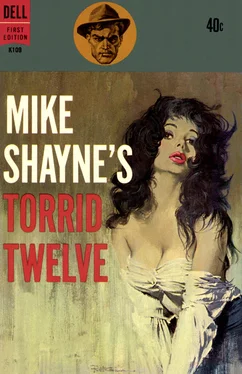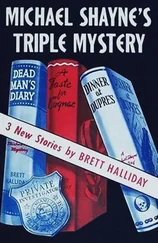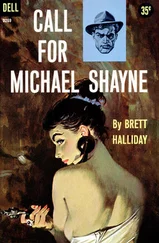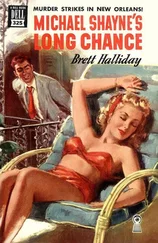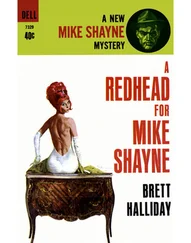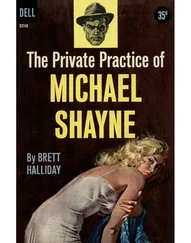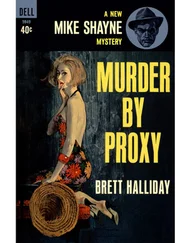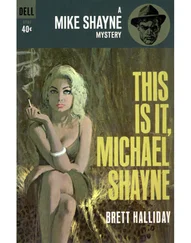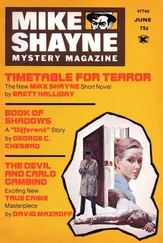Brett Halliday - Mike Shayne's Torrid Twelve
Здесь есть возможность читать онлайн «Brett Halliday - Mike Shayne's Torrid Twelve» весь текст электронной книги совершенно бесплатно (целиком полную версию без сокращений). В некоторых случаях можно слушать аудио, скачать через торрент в формате fb2 и присутствует краткое содержание. Город: New York, Год выпуска: 1961, Издательство: Dell Publishing, Жанр: Детектив, на английском языке. Описание произведения, (предисловие) а так же отзывы посетителей доступны на портале библиотеки ЛибКат.
- Название:Mike Shayne's Torrid Twelve
- Автор:
- Издательство:Dell Publishing
- Жанр:
- Год:1961
- Город:New York
- ISBN:нет данных
- Рейтинг книги:3 / 5. Голосов: 1
-
Избранное:Добавить в избранное
- Отзывы:
-
Ваша оценка:
- 60
- 1
- 2
- 3
- 4
- 5
Mike Shayne's Torrid Twelve: краткое содержание, описание и аннотация
Предлагаем к чтению аннотацию, описание, краткое содержание или предисловие (зависит от того, что написал сам автор книги «Mike Shayne's Torrid Twelve»). Если вы не нашли необходимую информацию о книге — напишите в комментариях, мы постараемся отыскать её.
Mike Shayne's Torrid Twelve — читать онлайн бесплатно полную книгу (весь текст) целиком
Ниже представлен текст книги, разбитый по страницам. Система сохранения места последней прочитанной страницы, позволяет с удобством читать онлайн бесплатно книгу «Mike Shayne's Torrid Twelve», без необходимости каждый раз заново искать на чём Вы остановились. Поставьте закладку, и сможете в любой момент перейти на страницу, на которой закончили чтение.
Интервал:
Закладка:
She had shrugged, moved her small high heels impatiently. “Peaceful for you, dull as hell for me.”
A small shiver had trembled along his backbone. “Please, Lucille. I don’t like to hear a lady swear. It isn’t fitting.”
She had laughed, a mocking, partly amused look in her eyes. “Honestly, Alfred. You are so — so stuffy and narrow-minded. People just don’t say things like that any more. I sometimes think you’re a throwback to the Victorian age.”
He had laced his hands together, stared down at his fingers. “You mean I’m old-fashioned? Yes, I suppose I am. But you must admit that the old ways were in many cases infinitely superior to the loose morals of today. Women smoking and drinking, for example.”
He had thought a peculiar light shone behind her jewel-like eyes. “Oh, yes — wicked women. Not at all like your mother.” Something in her tone made him feel as though his mother needed defending.
“My mother is a lady, if that’s what you mean.”
Lucille had looked at him almost pityingly then. “A perfect lady. When your father walked away and left her — and you — she said nothing. She lived a life of silent atonement for some sin she felt she had committed. She thought she had committed a sin simply because your father left her.”
He had thought he saw something moving in the blue sky, against the sun. “Isn’t that better than weeping and raging and putting the blame on my father?”
The bright eyes stared through him. “Oh, yes, certainly. But I can just picture Alfred, the boy, asking, ‘Mama, where’s Father? Why did he go away?’
“And I can picture your mother replying, ‘It was all my fault, Alfred. I failed him as a wife.’ Implying, too, that you failed him as a son.”
The blood was mounting to his temples. “She never said that!”
“Well, she made you think it, didn’t she? And when you wanted her — your only parent — perfect and without blemish, she showed you the fatal flaw in her character. Noble and self-sacrificing! It would have been better if she had said, ‘To hell with him. He was a selfish, egotistical brute who made my life miserable.’ Then your hate and your love could have been divided properly, normally, not lying all over each other.’
He was sure then. This was a dark piece, like an autumn leaf. It would dart down almost to his outstretched fingertips. He reached for it and Lucille had put up a small girlish hand, caught it, and brought it down.
“Good heavens,” she said, “what’s this awful thing?”
He had moved then before she could crush it and, of course, afterward he had no place to put her but the well.
He had encountered Susan in a shop in the village. His mother had driven him into town because, with the new dark piece and the new bright piece, he was feeling much better. Susan was larger than the others had been — almost buxom in fact.
Alfred’s taste usually ran to the petite, willowy type, but there was something about Susan’s shrewd, penetrating gaze that made him feel she could look deep into his mind, see the missing pieces. Perhaps she would help him search for them.
He didn’t say anything to her. They hadn’t been introduced and he preferred to meet her through his mother. “That one — over by the window, Mother.” He whispered, looking around carefully to see that no one else was watching. “Do you know her?”
His mother looked at him oddly, he thought. But it was probably a trick of his mind. He was sure she didn’t suspect about the others. His explanations had been too smooth, too convincing.
“I should like to have her out to the house. Invite her to come — for dinner.”
His mother started to say something, then seemed to think better of it. She closed her thin-lipped mouth, nodded her gray head. “All right, Alfred.”
He had left her then and gone back to sit in the car, content to wait for Susan.
He had been very gay at dinner, and afterward — afterward he had walked with Susan in the moonlight. He had helped her over the rough ground, taking care to seem very gallant. He had been quite sure she would appreciate it.
“So you’re the brilliant Alfred Grunner.” She looked at him from her sitting position against a stone wall, her clear blue eyes searching his face as if something about him disturbed and puzzled her. “You’re not the kind of young man I expected you to be.”
The evening air was soft as silk, and very warm. “I’m not? What did you expect?”
Her heavy eyelids closed. Long lashes lay on her white and pink cheeks. “Someone as dry as dust with his head in the clouds. Oddly enough,” the eyes opened wide, “you’re a man.”
His face was wearing a smile. He had a strange feeling inside him, like a brightly glowing pilot light.
“I suppose I am,” he said.
She leaned closer. “And I’m a woman.”
He repressed an urge to laugh. “So you are.” He ran his fingers over her shoulder, felt warmth beneath the summer dress.
She bent forward, her lips brushing his cheek. “Kiss me,” she said. He couldn’t help it. He drew back.
“What’s the matter?” she whispered, straining against him with passionate eagerness. “Are you afraid?”
His head felt heavy suddenly. “I don’t think so.”
She straightened up. “You mean I don’t appeal to you.” Her voice was harsh.
“Oh, yes,” he said, “you do. You do.”
She smiled again. “Well?”
She leaned against his chest, her body pliable and soft. It was pleasant to move his hand along her back, run his fingers along her hairline. She shivered against him, raised her head.
He put his mouth on hers and almost instantly drew back in revulsion. He knew she could read it in his face. He fought to hide it, but he could not.
“What’s the matter?” she said.
“I can’t explain it,” he said. “It’s nothing personal.” He tried to reach her hand but she pulled it away.
“I want you — God knows I do. But there’s something in me—” His voice was rising now, cracking in its torment. “Something that won’t let me.” His voice dropped to a whisper. “That never has let me.”
She was staring at him. “Never?”
He shook his head miserably. “Never.”
He was surprised by her laughter. It rose from her throat and climbed up to the sky. Her body shook and between sobbing giggles she gasped, “Good God, good God.”
While she was laughing he saw it. It was shimmery, like a firefly. But it wasn’t a firefly. It was a part of him, shining around her shoulders. Just before he moved she said, “I’ll have to teach you,” and laughed again.
She had joined the others in the well.
He had known Tessie before. She crept out — the memory of her — from the edge of the black curtain. She was not, he thought, an important memory but it was encouraging to know there was an exit slit permitting passage.
Tessie had a sad pink face, and drooping stringy hair. “I had a baby,” she said. “It died.”
He remembered, but he felt no pity. He had to think hard to make himself understand why he was without sympathy, and was triumphant when it came to him.
“You killed your baby,” he said. “It was your own fault.”
Her face contorted like a child’s, all ready to cry.
“No,” she said, “not my fault. Never my fault. It was an act of God.”
He had shouted at her, “Don’t blame God. You insisted on driving on an icy road. You insisted on drinking cocktails before you drove. Was it God who made the car swerve on the slippery curve? Was it God who held the steering wheel?” He was surprised at the rage he felt. “You deserved it. You killed your own baby.”
Tears flowed down her face, but she made no protest. He watched the tears closely, tried to count them. The rage was gone now. Polite interest had taken its place.
Читать дальшеИнтервал:
Закладка:
Похожие книги на «Mike Shayne's Torrid Twelve»
Представляем Вашему вниманию похожие книги на «Mike Shayne's Torrid Twelve» списком для выбора. Мы отобрали схожую по названию и смыслу литературу в надежде предоставить читателям больше вариантов отыскать новые, интересные, ещё непрочитанные произведения.
Обсуждение, отзывы о книге «Mike Shayne's Torrid Twelve» и просто собственные мнения читателей. Оставьте ваши комментарии, напишите, что Вы думаете о произведении, его смысле или главных героях. Укажите что конкретно понравилось, а что нет, и почему Вы так считаете.
